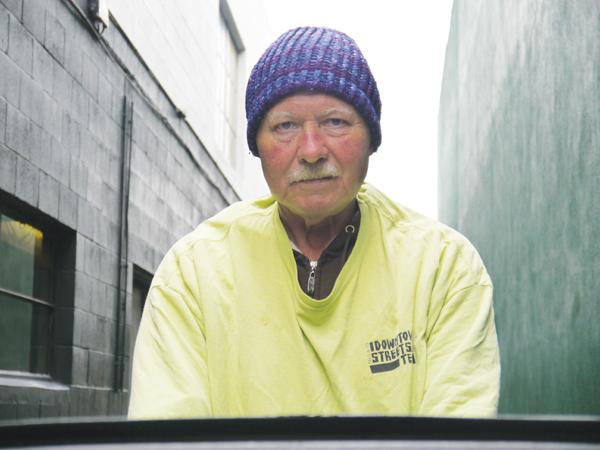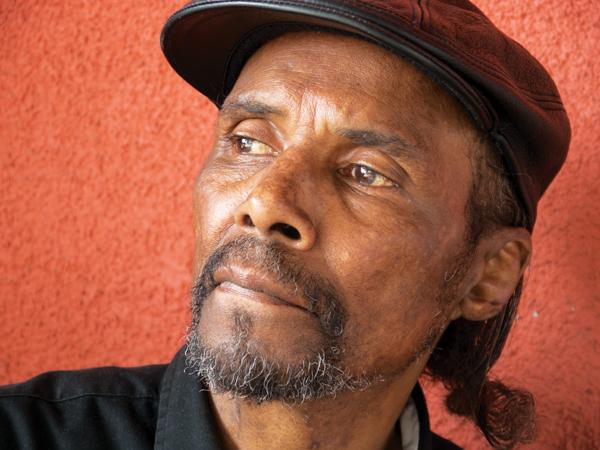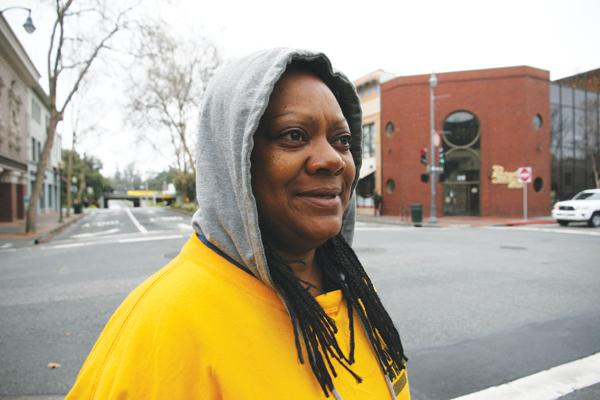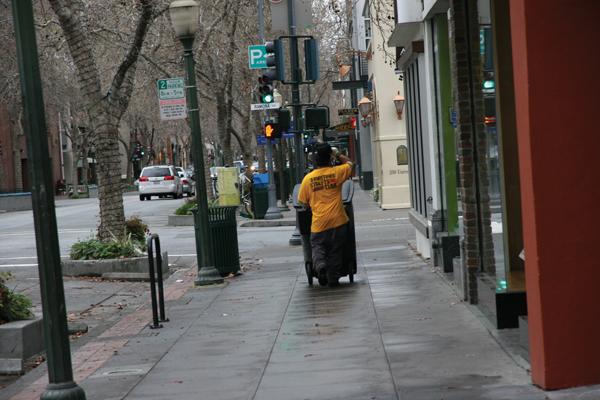
It’s a cloudy Sunday morning, just before eight o’clock on the corner of High and Hamilton street, and Joe Wysocki walks up and down a quiet parking lot, mud-caked Skechers resting momentarily on the pavement as he inhales deeply from a Pall Mall cigarette. He has been homeless for over 14 years.
A former alcoholic, Wysocki is now a member of the Downtown Streets Team, a transitional employment program, started in 2005, which seeks to empower the homeless by providing them with volunteer opportunities to clean up their communities.
Wysocki meets his other team members at 6 a.m every Sunday to pick up trash in the area. From 8 a.m. until 12 noon, he leads a group of six, collecting trash from the area around University Avenue and bringing it back to the parking lot dumpsters.
“It’s a good feeling to do it because you’re doing something productive for the neighborhood where a lot of us, for many different circumstances, have been unproductive for a period of our lives,” Wysocki says.
Ultimately, through the weekly clean-up crews, DST seeks to enable its members to get real jobs and eventually move on with their lives. With help from an array of employment specialists and case managers, the program ensures that each individual is getting back on the right track; whether that takes the form of an internship, vocational training, education, or a move to permanent housing.
“When we started the program we asked business owners what they were most concerned with in downtown Palo Alto,” says Chris Richardson, a Palo Alto High School graduate and director of DST. “They told us it was cleanliness and panhandling. So [with DST] we managed to kill two birds with one stone by turning the guy panhandling on the corner into a taxpayer by handing him a broom and asking him to sweep the streets of Palo Alto.”
With this model of turning homeless men and women into productive members of the community, the Streets Team has significantly impacted homelessness in communities such as Palo Alto. According to the federal agency of Housing and Urban Development, homelessness in Palo Alto has decreased 54 percent since the program’s creation.
Yet there is something more than housing, says executive director Eileen Richardson, something intangible, with which DST empowers the homeless, enabling them to rise from panhandling to become independent and productive members of society. Little by little, with each sweep of the broom, the Streets Team allows workers to regain their sense of dignity and piece their lives back together.
“We did a survey asking homeless people, ‘What is the worst thing about being homeless?’” Eileen Richardson says. “And they didn’t say, ‘I’m hungry,’ they didn’t say, ‘The rain.’ What they said over and over again was ‘The way people look down at me.’ And so if you can imagine people looking down at you all day, every day, for 10 years, you finally start feeling invisible and you lose all dignity.”
DST has also received national recognition, recently earning a MetLife Foundation Grant for Excellence in Civic Engagement on Feb. 11. MetLife Foundation, an organization helping to lower crime rates and increase safety in neighborhoods, also recognized the Palo Alto Business and Professional Association, Parking Committee, and Police Department for their partnership with DST in working to alleviate the woes of urban poverty and homelessness. As one of 10 programs nationwide selected for the honors, the Streets Team has come a long way since its founding.
When DST started Richardson was the only employee, working with four original members. Since then, the organization has grown to 32 staffers and expanded into four different communities —Palo Alto, San Rafael, San Jose and Sunnyvale — with plans for more: preparations are currently in the works to implement offshoots of the program in major cities like San Francisco, and the idea has been modeled in communities as far away as Daytona Beach, Fla. Helping hundreds of homeless every day and revolutionizing the paradigm of public service under Richardson’s visionary lead, DST has set its eyes on an ultimate purpose: to end homelessness completely.

You might say that Michael Davis is the heart and soul of DST. Davis, 65, is the only “black shirt” in the history of DST, meaning he serves as the operational supervisor for the entire organization, shuttling between the four different programs to oversee affairs. He estimates he has brought over 40 new members to DST. Yet before he turned to reconstructing the lives of others, he had been busy ruining them— the seedy looking guy on the corner passing along countless illegal bills and bottles.
“When you get old enough and mature enough so that you can be honest with yourself and look back on your life and say, ‘I messed up someone’s life’ — that stuff gets to you,” says Davis, who has been with the organization since 2007. “It bothers me, so I may not be able to help that individual, but I can help another individual that’s going that same route.”
Initially skeptical, Davis was inspired to stay after discovering friends — former druggies and alcoholics — whose lives had been dramatically transformed by DST and vouched for the program.
“In my time, I’ve covered a lot of ground, I’ve been in a lot of programs. I’ve never, never been in a program that even came close to [Downtown Streets],” says Davis. “I’m alive now, and I don’t mean that as far as I’m breathing. I’m alive, I’m part of the community. I’m part of the solution, not part of the problem.”
Davis serves as an ideal asset to the program: unlike other workers, he is able to use his personal experience from living on the street to convince homeless men and women to join the Streets Team.
“If don’t help somebody today it was a waste of a day,” Davis says. “I might as well have just stayed home in bed, because I served no purpose today. God didn’t create me to just come down here and breathe for 24 hours without being part of the world.”
From the first stages, the program provides a truly unique solution. Of the hundreds of current and former DST members, each and every one has joined via word of mouth from another homeless man or woman. Allowing the homeless to initiate this introduction ensures that the majority of members arrive of their own volition, with a desire to change.
“[The homeless people] just come to our meetings,” says Palo Alto and Sunnyvale project manager Greg Pensinger. “There’s no obligation, no background check. We try to keep the door open to everybody, because we don’t want to be just another organization that’s creating more barriers for people.”
Unlike many homeless organizations, DST does not concentrate as much on providing temporary food and shelter as it does trying to help members develop long-term skills and take control of their own lives.
“Part of empowering somebody is allowing them to make their own decisions and at their own pace,” Pensinger says. “By not telling somebody what they need to do, it puts the ball in their court.”
However, by resting the ultimate responsibility to succeed on the homeless and their own initiative, the organization also risks losing members who don’t quite pull things together.
“One of the biggest challenges for me is when you really put your heart out there, you put all your effort into working with somebody, and all they need to do is one last thing to take that goal home, and they’re not able to do that,” Pensinger says.
Although demoralizing, Pensinger sees these setbacks as all the more reason to continue reaching out a hand to those in need. While taking things on a case by case basis, DST typically allows team members to volunteer for a year before they are expected to find work. Those who struggle or do not succeed at first are given subsequent opportunities to continue their efforts.
“You never really know when it’s going to click,” Pensinger says. “I think keeping that door open even when somebody doesn’t succeed that first time is extremely important.”
When the program does click for an individual, the results have a deep effect, not only in helping themselves but in inspiring those around them. According to Pensinger, the story of one team member, above all others, left a profound impression.

Shannon Giovacchini was moments away from ending her life in front of a train, devastated after the loss of her mother and grandmother in quick succession.
“I was done,” Giovacchini says. “I basically figured, all I had to do was figure out a way to stop breathing, because I was dead inside.”
Yet the thought of scarring the lives of those around her in the midst of the holiday season caused Giovacchini to falter. She faded into a sort of half existence, wandering aimlessly, eventually winding up at a shelter in Sunnyvale. It was there that she first encountered DST supervisor Michael Davis. Still reeling from her personal tragedy, it was only after repeated insistence from Davis that she grudgingly agreed to attend a meeting.
“That was on a Thursday morning, and that’s the first DST meeting that I walked into, where they not only changed my life, they saved it,” Giovacchini says.
Seeing hope in people under similar or worse circumstances than her proved to be a powerful experience in changing her mindset. More than that, Giovacchini was struck to see her name written on the whiteboard next to the words, “welcoming a new member”.
“They didn’t even know me,” Giovacchini says. “I felt like I had no value and they’re saying, ‘You’re one of us. Right now, you don’t have to change a thing and you still have value, you’re still one of us.’”
After that meeting, Giovacchini quickly ascended up the ranks of the program, from running the kitchen at the Opportunity Center to becoming the first female “blue shirt”, or team manager. Moreover, Giovacchini’s involvement with the Streets Team has lead her to become a major advocate for homeless rights in the Bay Area.
“I can say that becoming homeless was one of the worst and best things that ever happened to me,” Giovacchini says. “Everyday now I go to work putting myself out for a job, and that’s to end homelessness. First here in the county, then statewide, then hopefully nationwide.”
By pulling her out of suicidal thoughts and giving her a new purpose in life, DST has completely transformed Giovacchini’s over the past three years.
“I thought that I was someone who had it all, but I realized that I didn’t because my life is so much fuller now,” Giovacchini says. “When they handed me that yellow shirt, I was part of a family again.”
Spurred by living examples like Giovacchini, DST continues to make positive changes for the homeless of the Bay Area. Many members are optimistic of the program’s future, citing Eileen Richardson’s driving determination.
“She [Richardson] fights for what she wants and she gets there,” Pensigner says. “I wouldn’t be surprised if, a few years down the road, we’ll be in more towns and communities in California, then all across the west coast and finally eastward.”
Richardson herself, though optimistic when starting the Streets Team seven years ago, could not have predicted its widespread effect on homelessness.
“Over the last year-and-a-half, we have homeless people making over $1.1M in jobs that they have,” Eileen Richardson says. “That’s just counting jobs that we found for folks in the last 18 months. That’s a pretty incredible impact, from people panhandling on the street to now making that much money in economic development.”
Some of the organization’s impact, while harder to quantify, has been no less tangible. According to Richardson, it is the symbiotic relationship between the program and the communities it serves.
“In a neighborhood in San Jose, our team went in and cleaned this entire playground that had syringes in it, needles, all sorts of drug paraphernalia,” Eileen Richardson says. “The second the team was done, it was like a movie; all these children came out of their houses and ran into the playground again to play. It just chilling, the idea that something like that can happen.”
The ripple effect of DST extends into every community it serves. Cleaning up one park, one street, one city at a time, DST continues to change the perception of homelessness and how it should be treated.
“The model [for DST] is so simple and it involves the entire community from the homeless to business owners to police and local government,” Chris Richardson says. “As long as the entire community and all of its components are willing to partner with us, we will be successful.”






